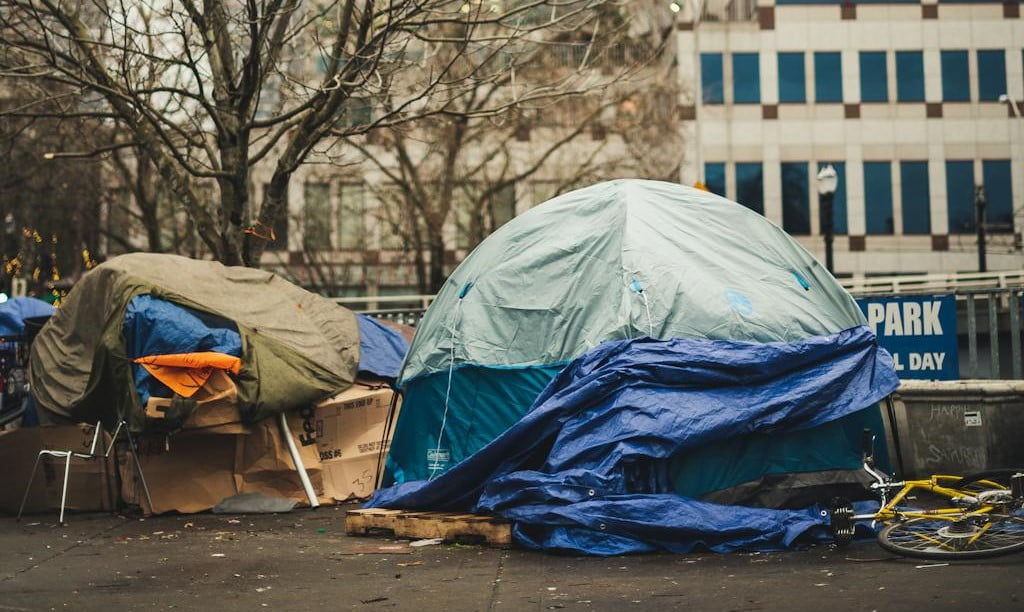The Coalition for Justice and Human Rights’ August 2023 constitutional challenge to the City of Edmonton’s encampment removals did not succeed, but this case wasn’t the first of its kind and likely won’t be the last.

As housing in Canada and Alberta becomes increasingly expensive, many people are being forced to live on the streets. Across the country, encampments are becoming more and more common. Many major cities are trying to deal with the crisis by removing encampments. (A previous LawNow article discussed whether encampments are a political or legal issue.)
Recently, a challenge to Edmonton’s encampment policy came before Alberta’s courts. In August 2023, the Coalition for Justice and Human Rights brought a constitutional challenge to the City of Edmonton’s encampment removals.
Canada’s History of Encampment Cases
The Edmonton case was not the first of its kind. These challenges are ways for groups to show the government has violated their constitutional rights. Often, these cases involve rights under the Canadian Charter of Human Rights and Freedoms.
In many encampment cases, groups allege that a government actor has violated their section 7 or section 15 rights. Section 7 of the Charter protects a person’s life, liberty, and security. Groups argue that when governments tear down encampments, they endanger the lives of the people living in them. Section 15 of the Charter makes all Canadians equal before the law and ensures all Canadians have equal protection from the law. Recent encampment cases have also attempted to argue equality rights for those living in encampments.
One of the first cases to bring housing issues into the Canadian courts was Tanudjaja v Attorney General (Canada) in 2013. This case was brought to the Ontario Superior Court on behalf of four unhoused individuals and a public interest group. They alleged the governments of Ontario and Canada had changed the law, which led to homelessness and violated their rights. They asked the court to declare their rights had been infringed. They also sought an order from the court that would make the government create new laws targeting homelessness and housing issues. The Ontario Superior Court dismissed the case, saying the Charter does not impose a positive right on the government to provide housing.
Positive rights are rights that require the government to provide something or take action. They are often contrasted with negative rights, which are rights that make people free to do something or take action. Encampment cases often ask the courts to order that the government engage a positive right to housing for Canadians.
The Supreme Court of Canada already decided on this issue in a 2002 case called Gosselin v Quebec. In that case, the Supreme Court ruled that section 7 of the Charter does not require the government to provide a basic income for all Canadians. Generally, the Supreme Court is not willing to impose financial requirements on the government. In the case of housing, the current state of the law follows that same trend. Courts are not willing to force the government to provide housing for all.
Edmonton’s Encampment Case and the Issue of Public Interest Standing
The Coalition for Justice and Human Rights brought a constitutional challenge to Alberta’s courts. They alleged that the City of Edmonton’s policies put people in danger and violated their rights. This lawsuit also sought an injunction, which would prevent the City of Edmonton from removing encampments when there are not enough shelter beds available.
In December of 2023, the City of Edmonton planned to clear multiple encampments in Edmonton. When the plan went public, the Coalition for Justice and Human Rights applied to the Court of King’s Bench for an emergency injunction. An emergency injunction is something the court can use to stop one party from taking an action that may be harmful to another party. Here, the court granted an injunction to prevent the clearing of encampments while court proceedings continued.
The final decision in the lawsuit was delivered in January 2024. Justice Martin decided in favour of the City of Edmonton. The Coalition for Justice and Human Rights did not have public interest standing to represent Edmonton’s unhoused people. Therefore, the City of Edmonton could proceed with their plans to remove encampments.
Public interest standing allows courts to hear issues of general public importance. Groups can claim public interest standing on behalf of other Canadians, even if the law in question does not affect them directly.
For a group to gain public interest standing, they must show three things:
- The issue in question is serious.
- The party bringing the issue before the courts has a personal stake in the matter or a genuine interest in the issue.
- There is no other reasonable way of bringing the issue to the courts.
Essentially, if a party does not have a personal stake in a serious issue, they must show they have a real interest in resolving it. Here, the Coalition for Justice and Human Rights was unable to show they had a genuine interest in the issue.
What’s next for encampment cases in Edmonton?
Since the Coalition for Justice and Human Rights was unable to show they had public interest standing, the justice did not deal with the crux of the issue, being whether the City of Edmonton’s encampment removals were constitutional. This leaves the door open for future court cases on this same issue. Future cases may answer the question of whether the City of Edmonton’s policies, or similar policies in other places, are violating the rights of unhoused people.
Looking for more information?
Looking for articles like this one to be delivered right to your inbox? SUBSCRIBE NOW!
DISCLAIMER The information in this article was correct at time of publishing. The law may have changed since then. The views expressed in this article are those of the author and do not necessarily reflect the views of LawNow or the Centre for Public Legal Education Alberta.

